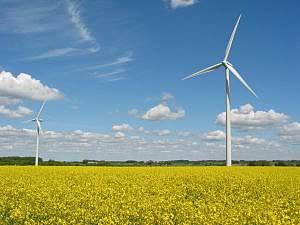 |
|||||||||
|
|||||||||||||||||||
| Climate
Change Bill - farming can deliver 16/11/06 The introduction of a Climate Change Bill in the Queen's Speech has been hailed as a great opportunity for UK agriculture to help deliver a more sustainable UK society and economy.
Speaking after the announcement NFU President Peter Kendall said the Bill was a great opportunity for British farmers to help reduce UK greenhouse gas emissions. He also highlighted it as: A positive step in encouraging renewable bioenergy and gaining a consensus for a joined up government delivery of the Energy White paper in March 2007 and heeding the warnings of the Stern Report. And a real challenge to live up to expectations to reverse the previous disappointments of missed targets, through the setting of realistic but accountable short and medium term targets which are independently assessed and reported upon, with a rigorous cross-departmental joined up approach. Mr Kendall said: “There is a great opportunity for British agriculture to engage and help achieve Government climate change targets, through the production of bioenergy from crops, woodland and wastes. “What is needed, however, is positive and tangible signals to ensure there is confidence to invest in these sectors. British agriculture can play a crucial role in reducing UK emissions and mitigating climate change effects - but it needs real Government commitment to maximise these potential benefits.” Support for renewables and renewable infrastructure, low carbon technologies and recognition of the importance of a secure energy supply was also acknowledged by the NFU. But it called for a balance of energy resources in which bioenergy plays a crucial role and is not overlooked in the race for wind, solar, hydrogen and nuclear options. In addition the NFU believes the announcement of further development of emission trading schemes offers great potential for agriculture in the long term but says lessons must be learnt from the failures of the EU emissions’ trading scheme and previous uncompetitive unregulated allocation across member states. Notes: Long term climate change targets have previously been missed raising concerns over the 60 per cent reduction by 2050. The Government dropped the 20 per cent carbon emission target by 2010 in 2006, despite being in the 1997 manifesto and policy for nine years. Emissions have risen five out of last eight years and emissions are now higher than in 1997. Any targets need to involve stakeholders to ensure there is a cost effective sector specific plan to meet these targets. Currently regulation arbitrarily affects horticulture, pigs and poultry while other sectors of society such as aviation are left unregulated. Agriculture has the means to provide solutions for climate change, and can offer a large number of mitigation options including growing renewable fuels, storing carbon in their soils and vegetation and by producing biogas from digesters.
| |||||||||||||||||||

|
|
||||||||||||||||||
| home | agri-services | pedigree
pen | news | dairy | beef | machinery quota | property | organisations | site map |
|||||||||||||||||||

